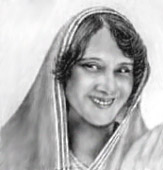 Mira Behn was an English woman and her original name was Madelene Slade. It was Gandhiji who gave her the name Mira, for her spirit of devotion. Mira Behn was an incarnation of devotion-Bhakti. She was a Hindu at heart. Bapu did not encourage her to change her religion, as it was important to live according to the fundamental principles of one`s own religion.
Mira Behn was an English woman and her original name was Madelene Slade. It was Gandhiji who gave her the name Mira, for her spirit of devotion. Mira Behn was an incarnation of devotion-Bhakti. She was a Hindu at heart. Bapu did not encourage her to change her religion, as it was important to live according to the fundamental principles of one`s own religion.
Early life of Mira Behn
Mira Behn was born on 22 November 1892 into a rich, aristocratic and highly cultured English family. Her father, Sir Edmond Slade, was an officer in the British Navy. Mira Behn had spent a couple of years in India as a young girl when Admiral Slade had been posted in Bombay as Commander-in-Chief of the East Indies Squadron. She was a nature lover. She talked with the cows, oxen, birds and plants as one talks with humans and was happy in the midst of nature. She was educated at home. She loved music, especially Beethoven`s symphonies. She found in Beethoven`s music a spiritual experience. She was not interested in the institution of marriage.
Mira Behn as Freedom Fighter
She was deeply impressed in Gandhiji`s teachings and had a strong urge to be his follower. So, at first she adopted a simple life. Thus she gave up hunting and started eating only vegetarian food. Gandhiji advised her to learn Hindi and carding and spinning and teach these to others. Mira Behn did this with religious zeal.
She was imprisoned in the Agakhan Palace Detention Camp for 93 weeks. It was a hectic period filled with pathos, sorrow and suffering
After Gandhiji`s arrest in the course of Salt Satyagraha, she toured several other provinces for promoting spinning and khadi. She went with Gandhiji to London when he went there for the Second Round Table Conference and became a link between Gandhiji and the English people.
Shortly after his return to India, Gandhiji was again put behind bars. The members of the Congress Working Committee were arrested. A reign of oppression and horror was un-leashed. Mira Behn collected information about the Government`s autocracy from all over the country and send reports to foreign countries, such as England, France, Germany, America and Switzerland. She was imprisoned for three months. When she came out of jail, a notice was served prohibiting her from entering Bombay. She defied the order and was again arrested and imprisoned for one year.
She accompanied Gandhiji in the Orissa Harijan tour and later went on a lecture tour to England and America. She met Hallifax, Hoare, Smuts and Churchill and tried to explain Gandhiji`s point of view to them. Mira Behn accompanied Bapu on some of his other tours also. She` was in charge of all personal services of Bapu.
Later she went to Bihar, carrying on khadi work among the villagers. After which, she withdrew into the Himalayas, where she observed silence for a year and translated hymns from the Rig Veda into English.
During the Second World War, she went to Orissa and other parts of India to organize the people to offer non-violent resistance against the threatened Japanese invasion. She talked with the officials and army leaders there and brought interesting reports to Bapu.
During Bapu`s fasts, Mira Behn took only one meal a day. This enabled her to share his suffering and yet maintain her strength to serve him. Mira Behn joined the evening prayers and often sang bhajans. She used to have discussions with Bapu during his walks. She wrote down her questions, prepared notes of Bapu`s replies and had them checked by him. She was sure India would be free before long.
She set up `Kisan Ashram` at a place between Roorkee and Haridwar district. She was appointed Honorary Special Advisor in the Animal Husbandry and Agriculture Department. After which, she set up Gopal Ashram in the Bhilangna valley in Tehri Garhwal district. Then she went to Kashmir for some time, at the invitation of Bakshi Ghulam Moham-mad. She did not get cooperation from officials anywhere and in the end left India in January 1959.
She spent the last days of her life listening to Beethoven`s music and writing a biography of Beethoven. Unfortunately it was not published. She took long walks in the forest of Baden, where once Beethoven had walked.
The Government of India awarded her with Padma Vibhushan in recognition of her service to the cause of India`s freedom. As Mira Behn was too weak to travel to India to receive the award the Indian Ambassador in Vienna went himself to present the award to Mira Behn. The Government of India also brought out a postage stamp in her honour. On 20 July1982, Mira Behn passed away. She had left instructions that she should be cremated and her ashes buried in the forest above the Beethoven stein near Baden.




















